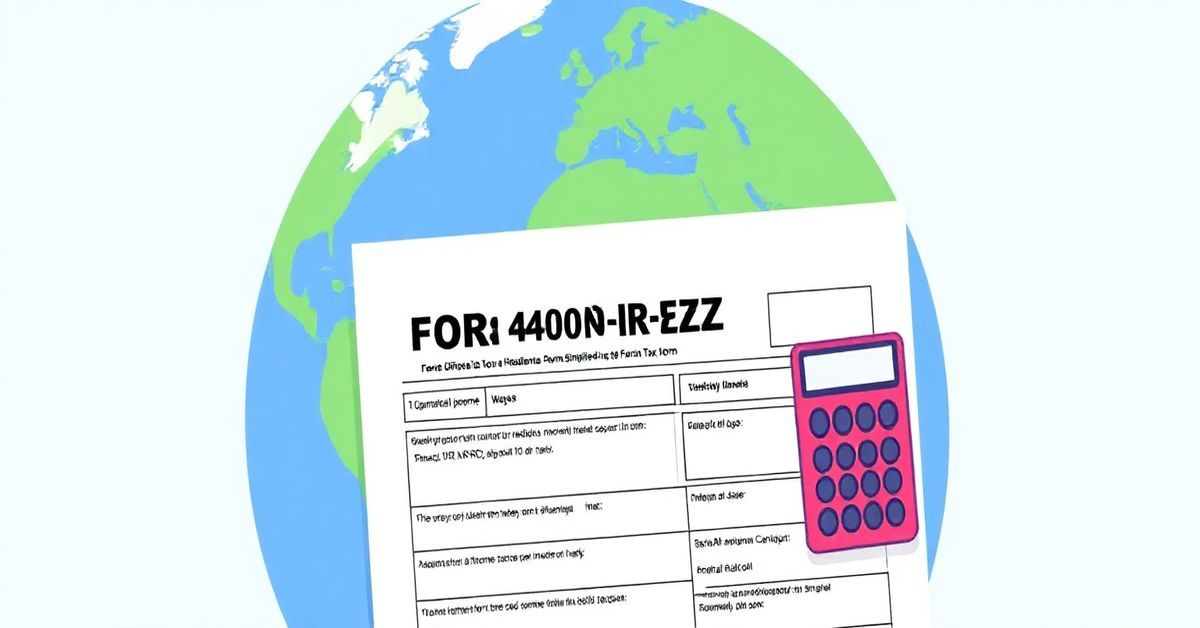Understanding Form 1040-NR-EZ: A Guide for Nonresident Aliens
If you’re a nonresident alien with income from the U.S., you’re probably wondering about your tax obligations. While the regular Form 1040 might seem daunting, the IRS offers a simpler option for some: Form 1040-NR-EZ. Let’s break down what this form is, who can use it, and how it works.
What Exactly is Form 1040-NR-EZ?
Form 1040-NR-EZ, officially titled “U.S. Income Tax Return for Certain Nonresident Aliens With No Dependents,” is a simplified version of the standard Form 1040-NR, which is the tax return used by most nonresident aliens. Think of it as a streamlined way for certain nonresidents to file their U.S. income taxes.
This form is designed to be easier to complete than Form 1040-NR. It’s shorter and has fewer lines to fill out, making it more approachable for those with straightforward tax situations. It’s important to know that not everyone qualifies to use this form.
Who Can Use Form 1040-NR-EZ?
The crucial question is, are you eligible to use this form? The IRS has specific criteria you must meet. You can use Form 1040-NR-EZ if all of the following apply to you:
- Nonresident Alien Status: You must be considered a nonresident alien for U.S. tax purposes. This generally means you are not a U.S. citizen, lawful permanent resident (green card holder), or meet the substantial presence test for being treated as a U.S. resident.
- No Dependents: You cannot claim any dependents on your tax return. This is a significant limitation of the form.
- Limited Income: Your income must be only from wages, salaries, tips, refunds of state and local taxes and/or scholarship or fellowship grants.
- Source of Income: Your income must only be from U.S. sources.
- No Itemized Deductions: You must not be itemizing your deductions. You take the standard deduction.
- No Tax Credits: You cannot claim any tax credits, except for certain tax withholding on the form.
- No Other Tax Payments: Your tax liability must be satisfied by income tax withheld, payments, or from tax treaties.
If you don’t meet all of these conditions, you can’t use Form 1040-NR-EZ, and you will need to use the longer Form 1040-NR.
How to Use Form 1040-NR-EZ: A Step-by-Step Look
Using Form 1040-NR-EZ is simpler than the regular form, but you still need to be careful and accurate. Here’s a general overview of the steps involved:
- Personal Information: Start by providing your basic information, like your name, address, social security number, and country of citizenship. You’ll also need to indicate your visa type (if applicable).
- Income Reporting: You will report your wages, salaries, tips, scholarship or fellowship grants and state or local tax refunds in this section.
- Adjusted Gross Income: The next step will be to total your income reported from the previous section.
- Standard Deduction: You are allowed to deduct a certain amount called standard deduction as long as you are not itemizing deductions. This amount can change every year.
- Taxable Income: Calculate your taxable income by subtracting your standard deduction from your adjusted gross income.
- Tax Calculation: Determine your tax liability. The tax rates that you use are different based on your income and filing status.
- Payments: Report any tax payments you’ve made so far, such as income tax withheld from your wages.
- Refund or Taxes Owed: Figure out if you are due a refund or if you owe more taxes.
- Sign and Date: Make sure to sign and date your tax return! An unsigned tax return may not be considered filed by the IRS.
Key Differences Between Form 1040-NR and 1040-NR-EZ
It’s helpful to understand the main differences between Form 1040-NR and Form 1040-NR-EZ:
- Complexity: 1040-NR-EZ is much simpler and shorter than the regular 1040-NR. The 1040-NR form requires a lot more information, making the 1040-NR-EZ more approachable for nonresidents who qualify.
- Who Can Use It: As detailed above, Form 1040-NR-EZ has strict eligibility requirements. Form 1040-NR is used by nonresident aliens that don’t qualify for the simplified form or that choose to use the regular form.
- Deductions and Credits: The 1040-NR form allows you to itemize deductions, claim tax credits, and report more complex financial transactions, while 1040-NR-EZ has restrictions on this.
Common Mistakes to Avoid When Filing Form 1040-NR-EZ
Here are a few common pitfalls to watch out for:
- Misunderstanding Nonresident Alien Status: Accurately determining your residency status is crucial. Misclassifying yourself can lead to significant tax errors.
- Incorrect Eligibility: Many people mistakenly try to use Form 1040-NR-EZ when they don’t qualify. If you’re uncertain, review the eligibility criteria carefully, or consult with a tax professional.
- Missing Deadlines: The tax deadline for nonresident aliens is the same as for U.S. citizens. Failure to file by the due date can result in penalties.
- Incorrectly Calculating Tax: Make sure to use the right tax rates and carefully do the calculations. Even minor calculation errors can delay processing by the IRS.
Tips for Filing Form 1040-NR-EZ Successfully
- Gather All Your Documents: Collect all your necessary tax documents, such as Form W-2 (for wages), Form 1042-S (for scholarships), and any other relevant income statements.
- Use IRS Resources: The IRS website has a wealth of information, including instructions for the form and FAQs.
- Consider Tax Software: Some tax software programs are designed to handle tax returns for nonresident aliens. These programs can help simplify the process.
- Seek Professional Help: If you’re unsure about any aspect of your tax return, it’s always best to seek help from a qualified tax advisor who specializes in nonresident alien taxation.
In Conclusion
Form 1040-NR-EZ can be a helpful tool for certain nonresident aliens with straightforward tax situations. By understanding the rules and requirements, you can ensure you’re filing correctly and meeting your tax obligations. Remember, accurate filing is essential for avoiding penalties and complications with the IRS. Always prioritize accuracy and seek help when needed.

